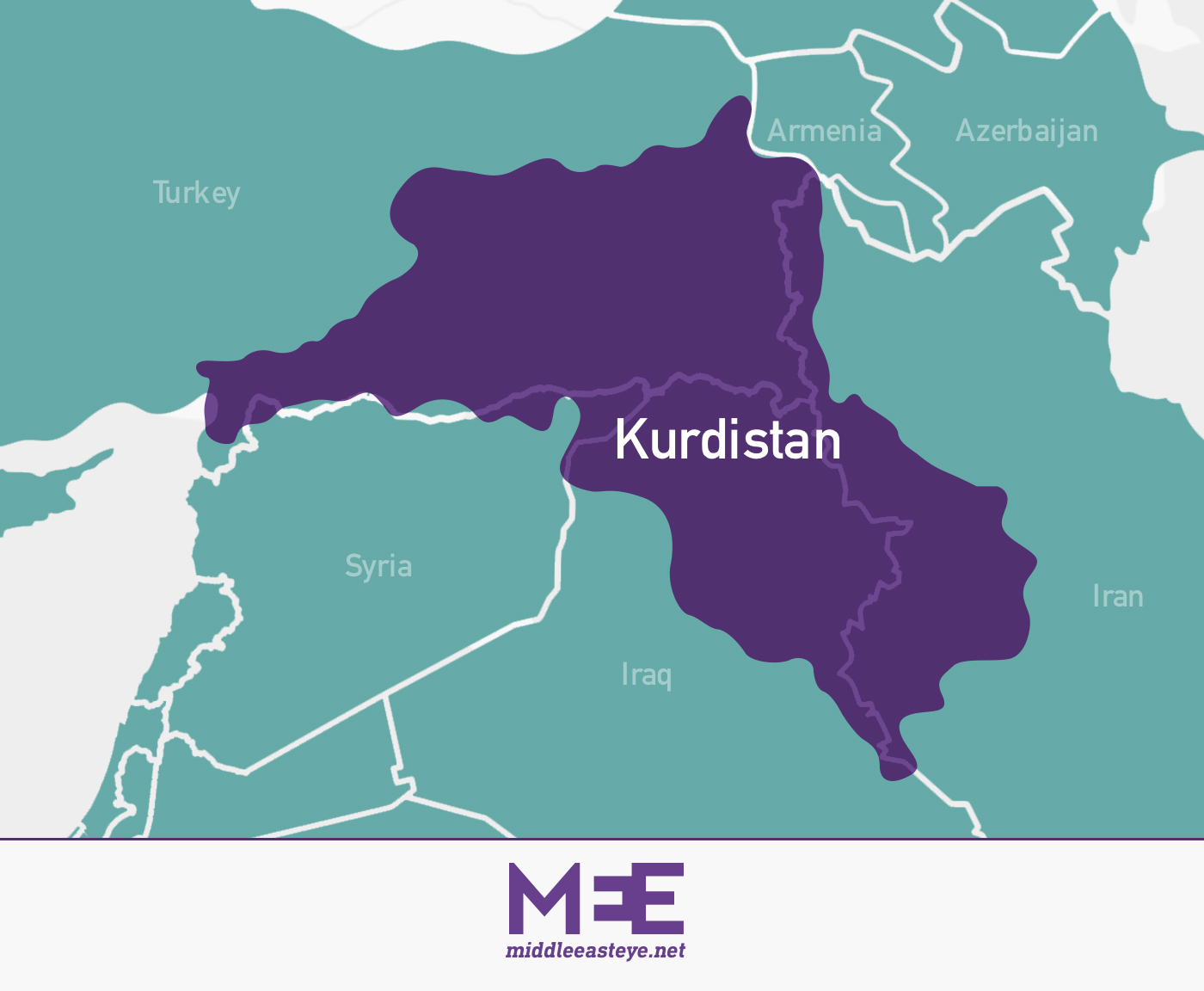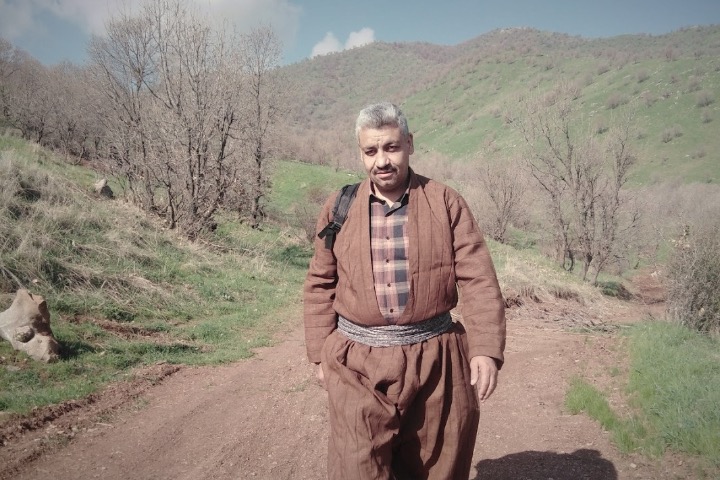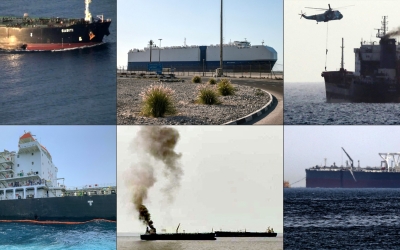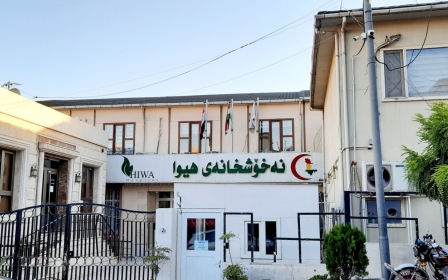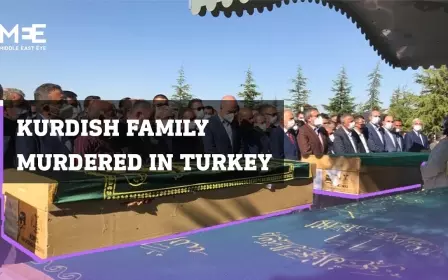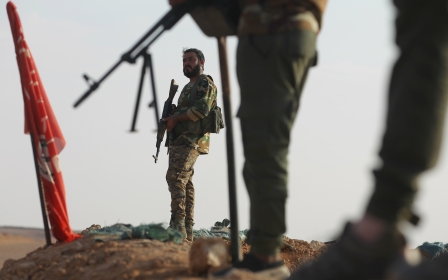Iraq: Iranian Kurdish refugees alarmed by 'assassination' of activist
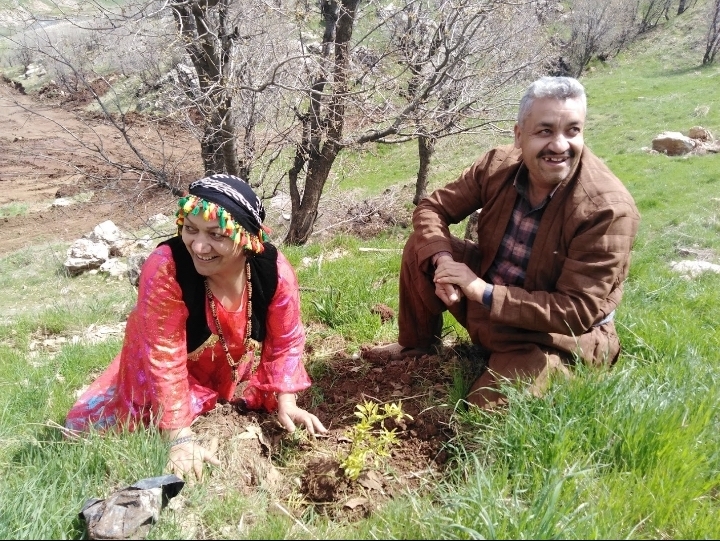
The wife of an Iranian Kurdish activist assassinated in northern Iraq in mid-July says her life is under threat as killers of her husband have yet to be held accountable.
“My own life is under grave threat, and I am defenceless. I call on the Kurdish authorities to put an end to the killing of Iranian Kurdish activists,” Zoleykha Nasseri, widow of the slain activist Behrouz Rahimi, told Middle East Eye.
Rahimi was killed in Zhaleh neighbourhood in the suburbs of Sulaimaniyah city near his workplace on 14 July. CCTV records the moment a BMW car with tinted windows and no licence plate follows and ambushes the activist, with an unknown number of assailants shooting at him from the car.
An unconscious Rahimi was taken to hospital but suffered severe bleeding and never recovered from his injuries.
Nasseri said that Iranian intelligence operatives previously threatened both of them.
New MEE newsletter: Jerusalem Dispatch
Sign up to get the latest insights and analysis on Israel-Palestine, alongside Turkey Unpacked and other MEE newsletters
Rahimi is one of hundreds of Iranian Kurds killed since 1991 in Iraqi Kurdistan, where they sought refuge from an Iranian crackdown.
Nearly 10 million Kurds, around 10 percent of the population of Iran, live in Iranian Kurdistan, in western Iran, along the borders with Iraq and Turkey.
For decades, they have been deprived of their political and cultural rights. Since the Islamic revolution of 1979, successive Iranian governments have been suppressing the Kurds with an iron fist, prompting an armed struggle to achieve autonomy within Iran. Thousands of Kurds have fled to the neighbouring Iraqi Kurdish region.
Rahimi, also known as Rebin, was born in 1973 in the Kurdish city of Sanandaj, east of Iran. Both Rahimi and his widow, who worked as civil activists and environmentalists, were forced to escape their hometown in 2012 as Iran’s intelligence was pursuing them, Nasseri said. They registered themselves as refugees with the UN High Commissioner for Refugees (UNHCR) in Erbil, the capital city of Iraqi Kurdistan, and were recognised as political asylum seekers.
Iranian death threats
Nasseri said that prior to her husband’s death, he turned down requests from Iranian security agencies to collaborate with them.
“Iran’s intelligence ministry had asked my husband to cooperate with them, but he refused. They then threatened to kill him if he refused to cooperate,” Nasseri told MEE.
She added that her late husband was a supporter of the militant Kurdish leftist, anti-Iranian government group the Free Life Party of Kurdistan (PJAK), which had previously downplayed the Iranian threats.
“PJAK comrades assured us and described the threats as ‘mere Iranian propaganda’, so we did not take the threats seriously,” she said.
She said she gave her testimony to the security forces of the Kurdistan Regional Government (KRG) who are investigating the killing of her husband. However, she does not know whether anyone has been arrested.
“I call on the security forces to act responsibly, find the perpetrators and bring them to justice,” she told MEE.
“I am sure they can do everything since there were CCTV cameras at the location of the crime. If security forces do not act, I am obliged to file a lawsuit with the region’s judiciary,” she added.
The incident is reminiscent of the killing of Eghbal Moradi, a Kurdish political activist and the father of the executed political prisoner Zanyar Moradi, who was murdered by unknown assailants on 17 July 2018 in the border town of Panjwen.
'Iran’s intelligence ministry had asked my husband to cooperate with them, but he refused. They then threatened to kill him if he refused to cooperate,'
- Nasseri, wife of the slain activist Behrouz Rahimi
Last year Mustafa Salimi, an Iranian Kurd who escaped from a prison in Iran and sought asylum in Iraqi Kurdistan, was reportedly handed over by Kurdish security forces to Iranian authorities who later executed him.
PJAK in a statement said that Iran is behind the “terrorist assassinations of Moradi and Rahimi”. The party has called on the authorities in the Kurdistan region “to take a stance against the terrorist acts of the occupying regime of Iran and their Kurdish mercenaries and submit the killers of Kurdish comrades into justice.”
The Washington DC-based Abdorrahman Boroumand Center for Human Rights in Iran (ABC) said in a statement that in its ongoing research “It has identified more than 540 Iranians whose successful assassination or kidnapping have been attributed to Iran.”
According to the ABC's research, most of the victims were targeted in Iran’s neighbouring countries, especially in Iraqi Kurdistan in the 1990s, where 329 people were killed.
Mohammed Amini, an Iranian Kurdish journalist living in Sulaimaniyah told MEE that he has also received numerous death threats.
"This is a simple proof that Iran continues to silence its opponents outside its borders. Through targeting Kurdish activists and journalists, Iran aims to spread terror, curb and limit the impacts of its political opponents,” he said.
When contacted by MEE, Sarkawt Ahmed, spokesperson of Sulaimaniyah police said that Rahimi’s case and investigations into the killing of foreigners are within the mandate of Sulaimaniyah security agencies, not the police apparatus.
MEE contacted two spokespersons for Sulaimaniyah's security, but one was not available, and the other declined to comment.
According to law number 4 of 2011 passed by the Kurdistan Parliament, security agencies are law enforcement bodies related to the Kurdistan Region Security Council, which is overseen by the President of Kurdistan region. But the two main Kurdish ruling parties, the Patriotic Union of Kurdistan (PUK) and the Kurdistan Democratic Party (KDP) are practically running their own security forces under their areas of control.
Sulaimaniyah is under the control of the PUK, while Erbil and Duhok are controlled by KDP.
The fact that security and intelligence agencies in Sulaimaniyah are managed by the PUK, currently preoccupied with a family rivalry among its leaders, has the potential to complicate any investigations into political assassinations in the region as Tehran could use its influence over feuding parties in a tit-for-tat game.
Security services accused of 'silence'
Meanwhile, the founder of the Paris-based Kurdistan Human Rights Network (KHRN) Rebin Rahmani told MEE that "it is too early to identify who committed the crime" when referring to the killing of Behrouz Rahimi. His organisation, he said, is expecting Sulaimaniyah security agencies to investigate the case and announce the outcome to the public.
“The silence of security agencies on those assassination cases has led to real concerns that Kurdish activists are increasingly at risk of being murdered,” he said.
“The Iraqi federal government and the KRG are responsible for protecting those Iranian Kurds who registered themselves as asylum seekers with UNHCR,” Rahmani said. “UNHCR is also negligent in this regard. Nobody takes responsibility towards Iranian Kurds.”
He argued that the silence of the international community towards Iran’s abuses against the human rights either locally or abroad "emboldened Iran’s security agencies to target opponents of the regime anywhere in the world."
'The silence of security agencies on those assassination cases has led to real concerns that Kurdish activists are increasingly at risk of being murdered,'
- Rebin Rahmani, Kurdistan Human Rights Network
Commenting on the accusation, Firas al-Khateeb, a UNHCR spokesperson, told MEE that "the safety and security of citizens and refugees as well as residents in any country is that of the host government. If there are breaches of security or issues concerning protection at that level then it would be taken with the government at the level of the Special Representative of the UN Secretary-General for Iraq."
Iranian Kurdish political asylum seekers in Iraq who are awaiting relocation to a third country have often complained of the lengthy UN asylum process, saying it compounds their poor living conditions and extends their legal limbo for years. They are estimated to be 30,000 people, none has been relocated to a third country since 2006, Arsalan Yar Ahmadi, a board member at the Hengaw Organisation for Human Rights in Kurdistan, told MEE.
A 26-year-old Iranian Kurdish asylum seeker, Behaz Mahmoudi, set himself alight on 18 May in front of the UN headquarters in Erbil in protest at the delays in his case. He died later of his wounds.
Mahmoudi’s self-immolation in front of cameras has sparked a wave of criticism of the perceived indifference of UN officials towards the refugee situation in the Kurdistan region.
Middle East Eye delivers independent and unrivalled coverage and analysis of the Middle East, North Africa and beyond. To learn more about republishing this content and the associated fees, please fill out this form. More about MEE can be found here.


